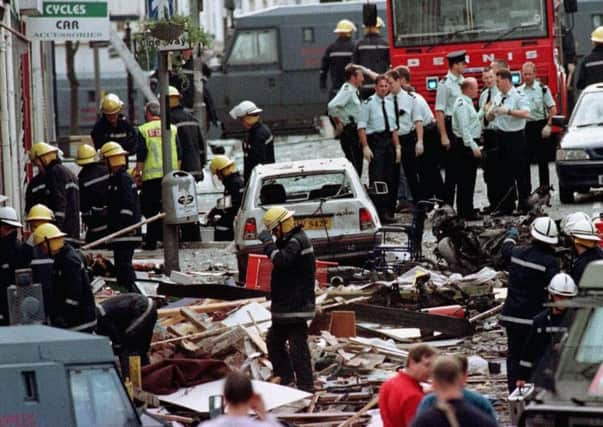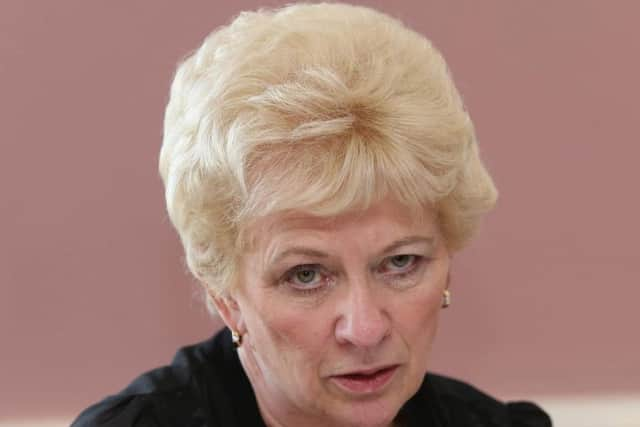Omagh bomb officers: We were wronged by O'Loan probe


In the ombudsman’s 2001 report – examining the RUC’s handling of the murder investigation – the ex-Special Branch detective inspector (DI) and detective sergeant (DS) faced severe criticism over how they handled a snippet of prior intelligence provided through an anonymous phone call.
The two officers, who have since retired, complained that ombudsman (PONI) investigators had declined to hear their version of events, and then produced a report that implied lives may have been saved if the officers had acted differently.
Advertisement
Hide AdAdvertisement
Hide AdThe car bomb in Omagh on August 15, 1998 claimed the lives of 29 people, including a woman pregnant with twins.


Among a number of other grievances, the former detectives claimed that the most “negative spin” was put on every aspect of their own actions, that justice was not served by denying them a right to be heard, and that the numerous measures they took to establish the value of the anonymous intelligence were ignored.
Having made representations to the government and various other bodies, the two men were informed that the ombudsman’s office was the only body that could investigate their complaint against the ombudsman – headed at the time by Baroness Nuala O’Loan.
Mrs O’Loan stood down in 2007 and the complaint was resolved to the officers’ satisfaction in March 2009 with a fulsome apology for the treatment they received.
Advertisement
Hide AdAdvertisement
Hide AdIn the letter of apology, then PONI chief executive Sam Pollock said: “I feel we failed you in a number of areas which I have identified throughout the report. I have apologised to you in person and I do so again in writing and I do so unequivocally.”
Mr Pollock, who resigned in April 2011, said that while he was “not detracting from the determinations of the ombudsman,” he was of the opinion his apology “in itself cannot undo the dissatisfaction you have felt for so long”.
He added: “I hope that it is the first step in you feeling that your integrity and esteem can be restored.”
The two officers had made firm arrangements to be interviewed by PONI on December 4, 2001; however, ombudsman staff unexpectedly cancelled the interviews and the report was published just over a week later.
Advertisement
Hide AdAdvertisement
Hide AdIn the report, it was asserted that the “victims, their families and officers of the RUC have been let down by defective leadership, poor judgment and a lack of urgency,” and stated that PONI had “concerns about the management and dissemination of intelligence by Special Branch”.
The report added: “If the [Kevin] Fulton intelligence had been considered along with other material held, had been properly assessed and documented, before deciding on no action, then the action of Special Branch might have been defensible.
“Regrettably the intelligence was not assessed or considered.”
However, a key finding of the 2001 report was: “It will never be known whether or not the bombing of Omagh could have been prevented if the RUC had taken more action in relation to the information it received during the period between 4 and 15 August 1998.”
Advertisement
Hide AdAdvertisement
Hide AdDespite the finding of the initial PONI investigation, Baroness O’Loan claimed last week – on the 20th anniversary of the atrocity – that she believed police could have prevented the attack.
Speaking to BBC Radio Ulster, Mrs O’Loan said: “When I reported on Omagh I said we didn’t know whether the bomb could have been prevented. It is now my very firm view that the bomb could have been prevented.”
She also said there was “sufficient intelligence to take action”.
The latest comments from Baroness O’Loan were challenged by PSNI Chief Constable George Hamilton, who questioned why she “changed her position”.
Advertisement
Hide AdAdvertisement
Hide AdMr Hamilton added: “If it is factually true and can be proven to any standard of proof whatsoever, why did she not say it in 2001 when she published her report?”
The former DI, who thought the matter had been closed with the PONI apology in 2009, has now spoken out for the first time in response to Mrs O’Loan’s claims.
“My main reason for not speaking out about this before was out of respect for the [Omagh] families, but this cannot be allowed to go unchallenged,” he said.
Commenting on the impact the initial ombudsman’s report, and subsequent press coverage, had on him the former DI said: “A newspaper headline was about being responsible for the deaths of 31 people. My daughter said to me ‘is that you daddy?’ The tears were tripping me. I had to sit them down to explain to her that I wasn’t guilty of this.”
Advertisement
Hide AdAdvertisement
Hide AdHe said: “Why were we not interviewed? If they had interviewed us, and then taken the logical progression of interrogating the system, they couldn’t have come to the conclusion that we should be maligned in that way.
“They couldn’t have done that, because we did everything that we possibly could, given what we had [to work with].
“I have a sense of anger at this mantra [Baroness O’Loan] comes out with ...‘I’m right, I’m right.’ She’s not right. She’s wrong on this.”
The ex-DI, who had almost 30 years’ service and retired in 2001 to pursue a new career, said that over the years he had been shunned by people who believed he was at least partly responsible for the deaths, but said the 2009 PONI apology “helped greatly”.
Advertisement
Hide AdAdvertisement
Hide AdThe former officer explained how himself and other SB colleagues acted swiftly to investigate the contents of the anonymous telephone call.
He said the call’s contents were shared with a number of other intelligence experts, in keeping with the procedures of the day, and that within 24 hours both police and military personnel had been deployed to check the movements of persons named in the call.
“She could have seen how everything works, how everything goes into a central pot and is then analysed and checked to decide if it’s worthy of issuing a threat message.”
The ex-detective sergeant, who was also angered by the former ombudsman’s comments, expressed similar concerns as his colleague.
Advertisement
Hide AdAdvertisement
Hide AdHe said: “Why didn’t she speak to our superiors at the time when we were still serving? She could have gone to our superiors and said ‘can you help me here?’ but that never happened.”
Earlier this week Mrs Patsy Gallagher, whose son Aiden was killed in the bombing, told the Irish News she welcomed Mrs O’Loan’s comments as an important development in their campaign to have a public inquiry in to the atrocity.
On Thursday night, a spokesman for the current Ombudsman said he had found no evidence the bomb could have been prevented.
“The position of the Office of Police Ombudsman is clear,” he said.
Advertisement
Hide AdAdvertisement
Hide Ad“In 2001, we issued a report in which we said that significant information was not handled correctly and that it was not possible to say what impact other action between 4 August and 15 August 1998 would have had, or whether action other than that taken by Special Branch could have prevented the Omagh Bomb.
“The current Police Ombudsman, Dr Michael Maguire, in a report in 2014 in which he considered specific matters relating to how the RUC Special Branch handled intelligence said his investigation had not identified any evidence that intelligence was available to police which if acted upon could have prevented the bombing.”